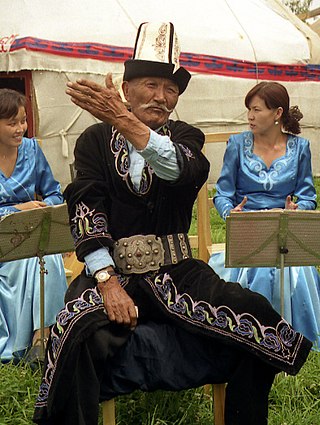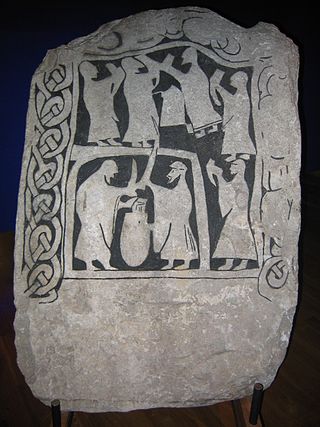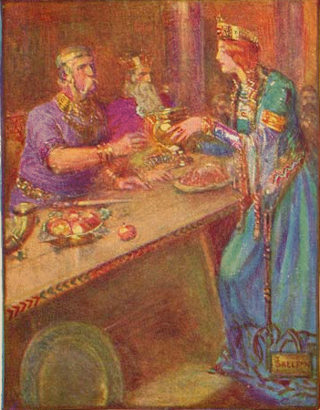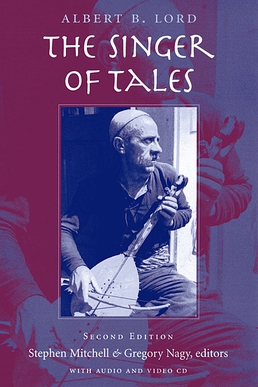Related Research Articles

Beowulf is an Old English epic poem in the tradition of Germanic heroic legend consisting of 3,182 alliterative lines. It is one of the most important and most often translated works of Old English literature. The date of composition is a matter of contention among scholars; the only certain dating is for the manuscript, which was produced between 975 and 1025 AD. Scholars call the anonymous author the "Beowulf poet". The story is set in pagan Scandinavia in the 5th and 6th centuries. Beowulf, a hero of the Geats, comes to the aid of Hrothgar, the king of the Danes, whose mead hall Heorot has been under attack by the monster Grendel for twelve years. After Beowulf slays him, Grendel's mother takes revenge and is in turn defeated. Victorious, Beowulf goes home to Geatland and becomes king of the Geats. Fifty years later, Beowulf defeats a dragon, but is mortally wounded in the battle. After his death, his attendants cremate his body and erect a barrow on a headland in his memory.
Old English literature refers to poetry and prose written in Old English in early medieval England, from the 7th century to the decades after the Norman Conquest of 1066, a period often termed Anglo-Saxon England. The 7th-century work Cædmon's Hymn is often considered as the oldest surviving poem in English, as it appears in an 8th-century copy of Bede's text, the Ecclesiastical History of the English People. Poetry written in the mid 12th century represents some of the latest post-Norman examples of Old English. Adherence to the grammatical rules of Old English is largely inconsistent in 12th-century work, and by the 13th century the grammar and syntax of Old English had almost completely deteriorated, giving way to the much larger Middle English corpus of literature.

Oral tradition, or oral lore, is a form of human communication in which knowledge, art, ideas and culture are received, preserved, and transmitted orally from one generation to another. The transmission is through speech or song and may include folktales, ballads, chants, prose or poetry. The information is mentally recorded by oral repositories, sometimes termed "walking libraries", who are usually also performers. Oral tradition is a medium of communication for a society to transmit oral history, oral literature, oral law and other knowledge across generations without a writing system, or in parallel to a writing system. It is the most widespread medium of human communication. They often remain in use in the modern era throughout for cultural preservation.

Symbel (OE) and sumbl (ON) are Germanic terms for "feast, banquet".

In prosody, alliterative verse is a form of verse that uses alliteration as the principal device to indicate the underlying metrical structure, as opposed to other devices such as rhyme. The most commonly studied traditions of alliterative verse are those found in the oldest literature of the Germanic languages, where scholars use the term 'alliterative poetry' rather broadly to indicate a tradition which not only shares alliteration as its primary ornament but also certain metrical characteristics. The Old English epic Beowulf, as well as most other Old English poetry, the Old High German Muspilli, the Old Saxon Heliand, the Old Norse Poetic Edda, and many Middle English poems such as Piers Plowman, Sir Gawain and the Green Knight, Layamon's Brut and the Alliterative Morte Arthur all use alliterative verse.

A scop was a poet as represented in Old English poetry. The scop is the Old English counterpart of the Old Norse skald, with the important difference that "skald" was applied to historical persons, and scop is used, for the most part, to designate oral poets within Old English literature. Very little is known about scops, and their historical existence is questioned by some scholars.
Solomon and Saturn is the generic name given to four Old English works, which present a dialogue of riddles between Solomon, the king of Israel, and Saturn, identified in two of the poems as a prince of the Chaldeans.
"Deor" is an Old English poem found on folio 100r–100v of the late-10th-century collection the Exeter Book. The poem consists of a reflection on misfortune by a poet whom the poem is usually thought to name Deor. The poem has no title in the Exeter Book itself; the title has been bestowed by modern editors.

"Widsith", also known as "The Traveller's Song", is an Old English poem of 143 lines. It survives only in the Exeter Book, a manuscript of Old English poetry compiled in the late-10th century, which contains approximately one-sixth of all surviving Old English poetry. "Widsith" is located between the poems "Vainglory" and "The Fortunes of Men". Since the donation of the Exeter Book in 1076, it has been housed in Exeter Cathedral in southwestern England. The poem is for the most part a survey of the people, kings, and heroes of Europe in the Heroic Age of Northern Europe.

Wealhtheow is a queen of the Danes in the Old English poem, Beowulf, first introduced in line 612.
"The Rhyming Poem", also written as "The Riming Poem", is a poem of 87 lines found in the Exeter Book, a tenth-century collection of Old English poetry. It is remarkable for being no later than the 10th century, in Old English, and written in rhyming couplets. Rhyme is otherwise virtually unknown among Anglo-Saxon literature, which used alliterative verse instead.

Næġling is the name of one of the swords used by Beowulf in the Anglo-Saxon epic poem of Beowulf. The name derives from "næġl", or "nail", and may correspond to Nagelring, a sword from the Vilkina saga. It is possibly the sword of Hrethel, which Hygelac gave to Beowulf. Næġling is referenced many times as a fine weapon—it is "sharp", "gleaming", "bright", "mighty", "strong", and has a venerable history as an "excellent ancient sword", "ancient heirloom", and "old and grey-coloured". However, the sword does not survive Beowulf's final encounter with the dragon, snapping in two—not because of the dragon's strength, but because of the hero's strength:

Oral-formulaic composition is a theory that originated in the scholarly study of epic poetry and developed in the second quarter of the twentieth century. It seeks to explain two related issues:
- the process by which oral poets improvise poetry
- the reasons for orally improvised poetry having the characteristics that it does

The Singer of Tales is a book by Albert Lord that formulates oral tradition as a theory of literary composition and its applications to Homeric and medieval epic. Lord builds on the research of Milman Parry and their joint work recording Balkan guslar poets. It was published in 1960.
The "Finnesburg Fragment" is a portion of an Old English heroic poem in alliterative verse about a fight in which Hnæf and his 60 retainers are besieged at "Finn's fort" and attempt to hold off their attackers. The surviving text is tantalisingly brief and allusive, but comparison with other references in Old English poetry, notably Beowulf, suggests that it deals with a conflict between Danes and Frisians in Migration-Age Frisia.
The Beasts of battle is a poetic trope in Old English and Old Norse literature. The trope has the wolf, the raven, and the eagle follow warriors into battle to feast on the bodies of the slain. It occurs in eight Old English poems and in the Old Norse Poetic Edda.

Germanic heroic legend is the heroic literary tradition of the Germanic-speaking peoples, most of which originates or is set in the Migration Period. Stories from this time period, to which others were added later, were transmitted orally, traveled widely among the Germanic speaking peoples, and were known in many variants. These legends typically reworked historical events or personages in the manner of oral poetry, forming a heroic age. Heroes in these legends often display a heroic ethos emphasizing honor, glory, and loyalty above other concerns. Like Germanic mythology, heroic legend is a genre of Germanic folklore.
Godfrid Storms was a Dutch professor of Old and Middle English Literature at the Catholic University of Nijmegen. He published his seminal dissertation on Anglo-Saxon charms in 1948, superseding a work that had stood as the authority for forty years, before obtaining his professorship there in 1956. Among his many other works were articles on Beowulf and the Sutton Hoo ship-burial.
Leonard Neidorf is an American philologist who is Distinguished Professor of English at Shenzhen University. Neidorf specializes in the study of Old English and Middle English literature, and is a known authority on Beowulf.
Carol Braun Pasternack was a professor of medieval English literature and language at the University of California, Santa Barbara (UCSB) from 1988 to 2013. She chaired the Medieval Studies department, and was also Dean of Summer Sessions at UCSB in 2011–2013.
References
- ↑ Foley, John M. Oral-Formulaic Theory and Research: An Introduction and Annotated Bibliography. New York: Garland Publishing, Inc. 1985. p. 42.; Foley cites "The Literary Character of Anglo-Saxon Formulaic Poetry" Publications of the Modern Language Association 81 (1966):, 334–41
- ↑ Magoun, Francis P. "The Oral-Formulaic Character of Anglo-Saxon Narrative Poetry." Speculum 28 (1953): 446–67
- ↑ Fry, Donald K. "The Cliff of Death in Old English Poetry." In Comparative Research in Oral Traditions: A Memorial for Milman Parry, ed. John Miles Foley. Columbus: Slavica, 1987, 213–34.
- ↑ Dane, J. A. "Finnsburh and Iliad IX: A Greek Survival of the Medieval Germanic Oral-Formulaic Theme The Hero on the Beach". Neophilologus 66:443–449
- ↑ Foley, John Miles. Oral-Formulaic Theory and Research: An Introduction and Annotated Bibliography, (NY: Garland Publishing, 1985, p. 200